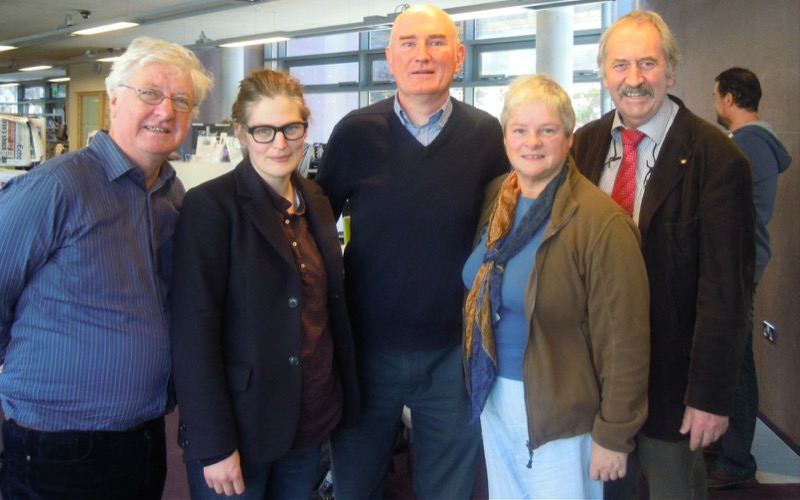Trinity College’s MOOC Team Travel to Wexford for Townhall Meet
Posted on: 14 October 2014
The team behind Trinity College’s Massive Open On-Line Course (MOOC) ‘Irish Lives in War and Revolution 1912-1923’ travelled to Wexford Town Library on October, 11th 2014, to meet with learners who had signed up for Trinity’s first free online course over the last six weeks. The event was organised by the Wexford County Librarian, Ms Fionnuala Hanrahan and was attended by members of study groups that had been meeting in local libraries all over the county.
A lively meeting ensued which lasted well over an hour, including side-conferences and one-to-ones at the close. The discussion ranged from general interpretations of Irish history through specific points-of-fact and evidence, to technical issues concerning the design and organisation of the MOOC. Feedback on the course was overwhelmingly positive, and suggestions for further MOOCs and improved modes of technical delivery abounded.
The attendees were delighted to learn that the MOOC would continue to be available to those who had registered for a considerable period of time after completion of the six-week roll-out. And the team from Trinity was delighted to learn that their principal intent to encourage learners to take control of the course and set about making their own historical judgements had been enthusiastically embraced by the Wexford groups.

Over 18,000 people signed up for the college’s first free online course which began on September, 1st 2014. The six-week course was developed by Trinity academics, Professor of Early Modern History and Historiography, Ciaran Brady, Assistant Professor in Modern History, Anne Dolan and Dr Ciarán Wallace of the Centre for Contemporary Irish History. The MOOC was available to anyone with access to the internet and enabled students anywhere to experience a Trinity education. The aim of the MOOC, according to the developers, was to widen access to education, with dynamic content delivered by Trinity’s history lecturers.
Commenting on the course, Professor of Early Modern History and Historiography, Ciarán Brady from Trinity’s School of Histories and Humanities, said: “Our aim with the course is to question that there is a single narrative or an easy explanation of the past. We want to challenge the silent assumption that there can be one authoritative voice claiming to have all the answers. To that end, we have designed a course intended to stimulate a critical attitude towards the question of whose history gets recorded and sought out, and whose history, ultimately, gets told.”
The course invited learners to explore the lives of the men, women and children who lived through war and revolution and the social changes that made modern Ireland. In doing so, the course looked beyond the famous names and focussed instead on more personal questions such as: How do people experience war and revolution? How does political change, violence, total war, affect life in its most basic ways? In addition, participants were given the opportunity to engage with a variety of original sources: textual, visual and aural as well as contradictory viewpoints in order to learn about the contested nature of all history, and the challenges facing historians.
Further information on online education at Trinity College Dublin https://www.tcd.ie/OnlineEducation/
